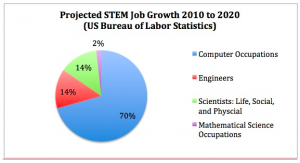 On November 11, 2013, The Chronicle for Higher Education published an article titled “The STEM Crisis: Reality or Myth?” which stated that many researchers do in fact consider the crisis a myth. Computer science is most certainly a STEM field, but when you unpack the data, you find that there really is a crisis for computer science. Ed Lazowska, Past Chair of the Computing Community Consortium (CCC) and Professor of Computer Science and Engineering at the University of Washington, and David Patterson, Professor in Computer Science at the University of California at Berkeley, have written a Letter to the Editor of The Chronicle explaining the data. From their Letter:
On November 11, 2013, The Chronicle for Higher Education published an article titled “The STEM Crisis: Reality or Myth?” which stated that many researchers do in fact consider the crisis a myth. Computer science is most certainly a STEM field, but when you unpack the data, you find that there really is a crisis for computer science. Ed Lazowska, Past Chair of the Computing Community Consortium (CCC) and Professor of Computer Science and Engineering at the University of Washington, and David Patterson, Professor in Computer Science at the University of California at Berkeley, have written a Letter to the Editor of The Chronicle explaining the data. From their Letter:
Let us introduce you to the U.S. Bureau of Labor Statistics, our second independent data source. The BLS projects job growth over a 10-year period for just about every job title you can imagine. Using the latest BLS data, the graph below shows the percentage of job growth in this decade divided between the sciences, engineering, mathematics, and IT. The BLS expects software-engineering jobs to grow by 30 percent this decade, labeling it officially as growing “much faster than average,” which is the highest BLS distinction.
The letter continues by discussing the importance of computing and computational thinking not just for computing careers, but in all fields.
“Computational thinking”—problem analysis and decomposition, algorithmic thinking, algorithmic expression, abstraction, modeling, stepwise fault isolation—is central to an increasingly broad array of fields. Programming is not just an incredibly valuable skill (although it certainly is that)—it is the hands-on inquiry-based way that we teach computational thinking. Those who can practice computational thinking, and who can wield the power of computer effectively, will be in the position to make greater contributions than those who can’t. Indeed, the 2013 Nobel Prize in Chemistry was for computer models, and the official press release said, “Today the computer is just as important a tool for chemists as the test tube.”
Richard Dawkins, author of the classic book The Selfish Gene, commented similarly: “Biology nowadays is a branch of computer science.”
Fields from anthropology to zoology are becoming information fields, which is why we think students of all majors should study computer science.
It is clear that all students should learn computing so they have the tools to create the currently unimaginable which could change the world. You can help encourage students to learn more about computer science by participating in The Hour of Code during Computer Science Education Week, December 9-15, 2013.










